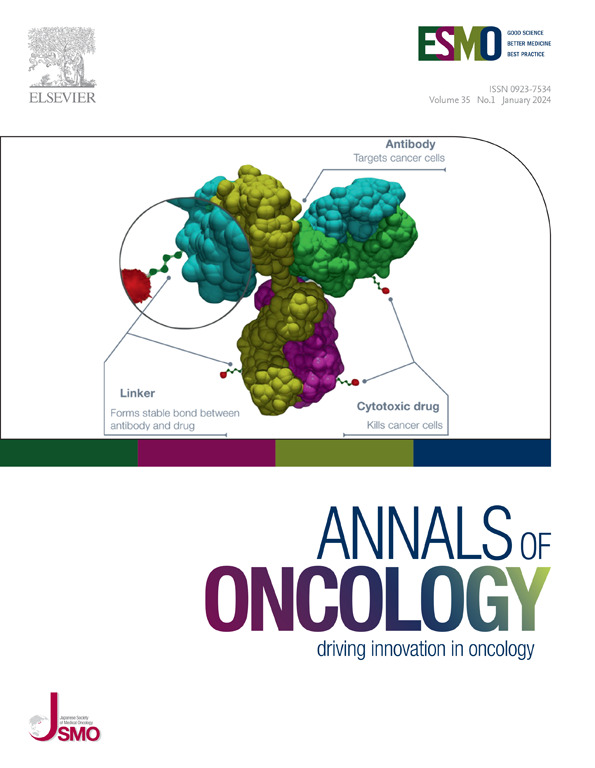Avelumab + axitinib versus sunitinib as first-line treatment for patients with advanced renal cell carcinoma: final analysis of the phase III JAVELIN Renal 101 trial
IF 56.7
1区 医学
Q1 ONCOLOGY
引用次数: 0
Abstract
Background
In the phase III JAVELIN Renal 101 trial (NCT02684006), first-line treatment with avelumab + axitinib resulted in significantly longer progression-free survival (PFS) and a higher objective response rate (ORR) versus sunitinib in patients with advanced renal cell carcinoma (aRCC). We report the final analysis, including the primary analysis of overall survival (OS).
Patients and methods
Patients with untreated aRCC (any prognostic risk score) were enrolled. The primary endpoints were OS and PFS in the programmed death-ligand 1-positive (PD-L1+) population. ORR, duration of response, safety, and patient-reported outcomes (PROs) were also assessed.
Results
The minimum follow-up was 68 months in all patients. The median OS with avelumab + axitinib versus sunitinib, respectively, was 43.2 months [95% confidence interval (CI) 36.5-51.7 months] versus 36.2 months (95% CI 29.8-44.2 months) in the PD-L1+ population [hazard ratio (HR) 0.86 (95% CI 0.701-1.057); P = 0.0755] and 44.8 months (95% CI 39.7-51.1 months) versus 38.9 months (95% CI 31.4-45.2 months) in the overall population [HR 0.88 (95% CI 0.749-1.039); P = 0.0669]. Investigator-assessed PFS remained prolonged with avelumab + axitinib versus sunitinib [5-year event-free rate in the overall population, 12.0% (95% CI 8.9% to 15.6%) versus 4.4% (95% CI 2.5% to 7.3%)]. ORR in the overall population was 59.7% (95% CI 55.0% to 64.3%) with avelumab + axitinib versus 32.0% (95% CI 27.7% to 36.5%) with sunitinib; duration of response was ≥5 years in 16.4% (95% CI 12.0% to 21.4%) versus 9.2% (95% CI 4.6% to 15.7%), respectively. Rates of grade ≥3 treatment-related adverse events were 66.8% versus 61.5%, respectively. PROs were similar between arms.
Conclusions
JAVELIN Renal 101 provides the longest follow-up to date for immune checkpoint inhibitor + tyrosine kinase inhibitor combination treatment from a phase III trial in aRCC. OS analyses favored avelumab + axitinib versus sunitinib but did not reach statistical significance; subsequent treatment may have impacted results. Avelumab + axitinib provided long-term efficacy benefits versus sunitinib, including prolonged PFS, a nearly doubled ORR, and more durable responses, with a manageable long-term safety profile.
阿维单抗+阿西替尼vs舒尼替尼作为晚期肾细胞癌患者的一线治疗:JAVELIN肾101试验3期的最终分析
背景:在JAVELIN肾101 iii期临床试验(NCT02684006)中,与舒尼替尼相比,阿维单抗+阿西替尼一线治疗可显著延长晚期肾细胞癌(aRCC)患者的无进展生存期(PFS)和更高的客观缓解率(ORR)。我们报告最终分析,包括总生存期(OS)的初步分析。患者和方法:纳入未经治疗的aRCC患者(任何预后风险评分)。主要终点是程序性死亡配体1阳性(PD-L1+)人群的OS和PFS。ORR、反应持续时间(DOR)、安全性和患者报告的结果(PROs)也进行了评估。结果:所有患者的最短随访时间为68个月。在PD-L1+人群中,阿维单抗+阿西替尼vs舒尼替尼的中位OS (95% CI)分别为43.2 (36.5-51.7)vs 36.2(29.8-44.2)个月(风险比[HR], 0.86 [95% CI, 0.701-1.057];P=0.0755)和44.8 (39.7-51.1)vs 38.9(31.4-45.2)个月(HR, 0.88 [95% CI, 0.749-1.039];P = 0.0669)。研究者评估的阿维单抗+阿西替尼与舒尼替尼的PFS仍然延长(总体人群的5年无事件率[95% CI], 12.0%[8.9%-15.6%]对4.4%[2.5%-7.3%])。总体人群的ORR (95% CI)为阿维单抗+阿西替尼组59.7%(55.0%-64.3%),而舒尼替尼组32.0% (27.7%-36.5%);DOR (95% CI)≥5年的分别为16.4%(12.0%-21.4%)和9.2%(4.6%-15.7%)。≥3级治疗相关不良事件发生率分别为66.8%和61.5%。两组之间的赞成者相似。结论:JAVELIN Renal 101在aRCC的一项3期试验中提供了迄今为止最长的免疫检查点抑制剂+酪氨酸激酶抑制剂联合治疗的随访。OS分析倾向于阿维单抗+阿西替尼vs舒尼替尼,但没有达到统计学意义;随后的治疗可能会影响结果。与舒尼替尼相比,Avelumab + axitinib提供了长期疗效优势,包括延长的PFS,几乎翻倍的ORR,更持久的反应,具有可管理的长期安全性。
本文章由计算机程序翻译,如有差异,请以英文原文为准。
求助全文
约1分钟内获得全文
求助全文
来源期刊

Annals of Oncology
医学-肿瘤学
CiteScore
63.90
自引率
1.00%
发文量
3712
审稿时长
2-3 weeks
期刊介绍:
Annals of Oncology, the official journal of the European Society for Medical Oncology and the Japanese Society of Medical Oncology, offers rapid and efficient peer-reviewed publications on innovative cancer treatments and translational research in oncology and precision medicine.
The journal primarily focuses on areas such as systemic anticancer therapy, with a specific emphasis on molecular targeted agents and new immune therapies. We also welcome randomized trials, including negative results, as well as top-level guidelines. Additionally, we encourage submissions in emerging fields that are crucial to personalized medicine, such as molecular pathology, bioinformatics, modern statistics, and biotechnologies. Manuscripts related to radiotherapy, surgery, and pediatrics will be considered if they demonstrate a clear interaction with any of the aforementioned fields or if they present groundbreaking findings.
Our international editorial board comprises renowned experts who are leaders in their respective fields. Through Annals of Oncology, we strive to provide the most effective communication on the dynamic and ever-evolving global oncology landscape.
 求助内容:
求助内容: 应助结果提醒方式:
应助结果提醒方式:


